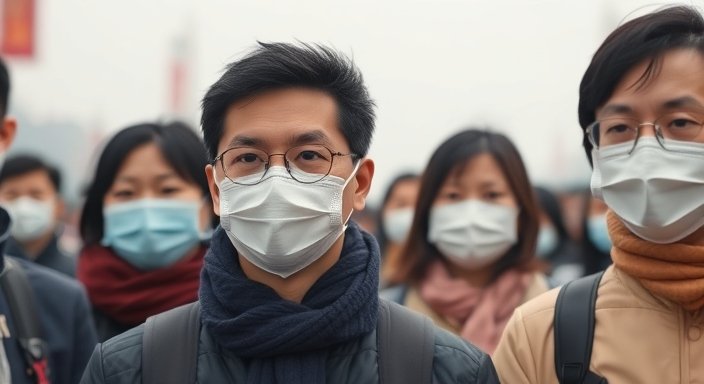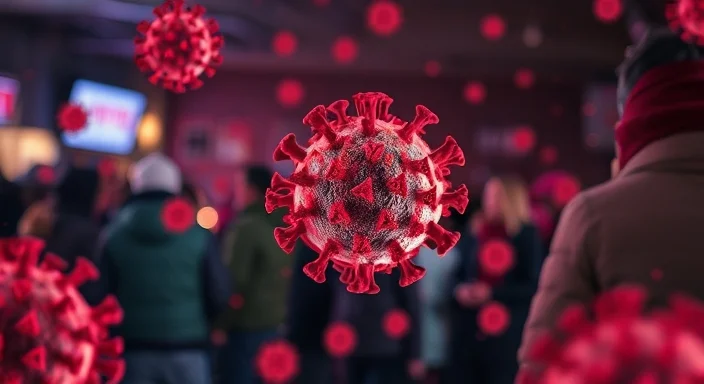Human Metapneumovirus (hMPV) is a lesser-known but significant respiratory virus that has been increasingly recognized for its impact on public health. Despite its relatively recent discovery, hMPV is believed to have been circulating among humans for decades, causing respiratory illnesses across all age groups. This article provides a detailed look at what hMPV is, how it spreads, its symptoms, treatment options, and preventive measures.
What is Human Metapneumovirus (hMPV)?
Human Metapneumovirus was first identified in 2001 by researchers in the Netherlands. It belongs to the Paramyxoviridae family, which also includes the Respiratory Syncytial Virus (RSV). hMPV is a single-stranded RNA virus that primarily targets the respiratory system. It’s most prevalent during late winter and spring, though infections can occur year-round.
While it can infect individuals of all ages, hMPV poses the greatest risk to young children, older adults, individuals with weakened immune systems, and people with underlying health conditions such as asthma or chronic obstructive pulmonary disease (COPD).
Symptoms of hMPV Infection
The symptoms of hMPV can vary from mild to severe and often mimic other respiratory infections like the flu or RSV. Common symptoms include:
- Cough
- Fever
- Nasal congestion or runny nose
- Sore throat
- Fatigue
- Shortness of breath
In severe cases, hMPV can lead to complications such as:
- Bronchitis
- Pneumonia
- Exacerbation of asthma or COPD
Infants, older adults, and immunocompromised individuals are more likely to experience severe symptoms requiring medical intervention.
How Does hMPV Spread?
Human Metapneumovirus spreads in ways similar to other respiratory viruses, primarily through:
- Respiratory droplets: When an infected person coughs or sneezes, tiny droplets containing the virus can be inhaled by others.
- Direct contact: Touching an infected person or contaminated surfaces and then touching your eyes, nose, or mouth.
The virus can survive on surfaces for several hours, making hygiene and surface disinfection crucial in preventing its spread.
Diagnosis
Diagnosing hMPV often requires laboratory testing. Healthcare providers may use:
- PCR (Polymerase Chain Reaction) tests to detect viral genetic material.
- Antigen tests to identify viral proteins.
These tests are typically performed using a nasal or throat swab.
Treatment
Currently, there is no specific antiviral treatment for hMPV. Most cases are managed with supportive care, including:
- Adequate rest.
- Staying hydrated.
- Over-the-counter medications to reduce fever and alleviate symptoms like nasal congestion.
In severe cases, especially in high-risk groups, hospitalization may be required. Treatments in such cases can include oxygen therapy and other supportive measures.
Preventing hMPV Infection
While there is no vaccine for hMPV, you can reduce your risk of infection with these preventive measures:
- Practice good hand hygiene: Wash your hands frequently with soap and water for at least 20 seconds.
- Avoid touching your face: Especially your eyes, nose, and mouth, to prevent introducing the virus into your system.
- Disinfect commonly touched surfaces: Regularly clean doorknobs, light switches, smartphones, and countertops.
- Avoid close contact with sick individuals: Maintain distance from people showing symptoms of respiratory illness.
- Cover your coughs and sneezes: Use a tissue or your elbow to prevent spreading droplets.
- Stay home when sick: Protect others by isolating yourself if you’re experiencing symptoms.
Key Takeaway
Human Metapneumovirus is an important yet underrecognized cause of respiratory illness. Understanding its symptoms, transmission, and preventive measures can help individuals and families reduce their risk of infection and seek timely medical care when needed. By spreading awareness about hMPV, we can better protect vulnerable populations and mitigate its impact on public health.
Sources
- Centers for Disease Control and Prevention (CDC): Human Metapneumovirus. https://www.cdc.gov/
- World Health Organization (WHO): Respiratory Virus Overview. https://www.who.int/
- Journal of Infectious Diseases: Epidemiology of hMPV.
- American Lung Association: hMPV and Respiratory Health. https://www.lung.org/






